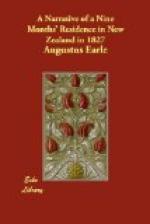This was followed by a general attack upon the good things King George had prepared for them. The slaves came flocking in, bearing baskets of hot kumaras, potatoes, and fish. I observed their tears had not spoiled their appetites; they ate voraciously. After having done great honour to the feast, they all started on their feet for a dance, which lasted a long while, and with which they concluded the evening.
The dances of all savage nations are beautiful, but those of the New Zealanders partake also of the horrible. The regularity of their movements is truly astonishing; and the song, which always accompanies a dance, is most harmonious. They soon work themselves up to a pitch of frenzy; the distortions of their face and body are truly dreadful, and fill the mind with horror. Love and war are the subjects of their songs and dances; but the details of the latter passion are by far the most popular among them. I was astonished to find that their women mixed in the dance indiscriminately with the men, and went through all those horrid gestures with seemingly as much pleasure as the warriors themselves.
The next morning I was awakened, at daybreak, by the most dismal sounds I had ever heard. I started up, and found it proceeded from the tribes parting with each other. They had divided themselves into little parties, each forming a circle, and were crying most piteously, and cutting their flesh as a cook would score pork for roasting. On such occasions each is armed with a sharp shell, or, if he can possibly obtain so valuable a prize, a piece of a broken glass bottle. All were streaming with tears and blood, while Hongi and his friends embarked in their large and richly-ornamented canoes, and sailed from our beach. After his departure, I soon discovered that, notwithstanding their apparent affection, King George and his friends were most happy their visitors had left them; and that it was more the dread of Hongi’s power, than love for him, that induced them to treat him with such respect and homage.




